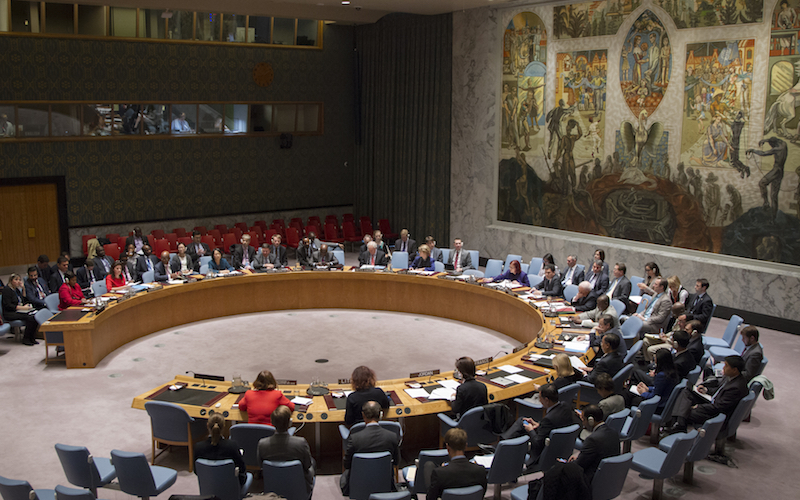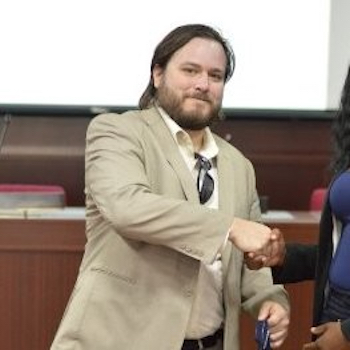
70 Years of Successful Security and Fatal Failures at the UNSC
With the UN Security Council approaching the 70th anniversary of its first meeting on January 17th, it seems a fitting time to look back and reflect on how well it has achieved its mandate, and how that mandate has evolved to accommodate new threats. The Security Council’s prime function has been to tackle threats to peace and security throughout the world.
On a macro scale, one could say the Security Council has indeed done a more than serviceable job. According to a study by Harvard professor Steven Pinker, we are living in the most peaceful time in human history. In this moment an individual is less likely to die during armed combat than in any other moment since the rise of civilization. It is not a stretch to suggest that the Security Council, an organization brought about to help create a more peaceful world, played a major role in bringing about the relative peace the world enjoys today.
The Security Council came about in large part to prevent the mayhem and destruction of general war that the world experienced during World Wars I and II. Since no general wars have taken place since the adoption of the UN charter, we can say that the Security Council and the UN as a whole have successfully served that primary function.
Obviously they cannot claim all of the credit for the successes in areas under their purview. For example, the advent of nuclear weapons and the highly interdependent nature of modern economies makes general war between great powers far too costly and are themselves mitigating factors.
We can surely give the Security Council its fair share of credit, as it provided a forum to decide exactly how to deal with the sorts of brushfires that might have in the past drawn powerful nations into conflict with each other.
Along with these successes are, of course, shortcomings and outright failures. There is a long list of tragedies the Security Council stood by and allowed to happen by not taking prompt and effective steps to prevent further human suffering. The two most glaring examples are the genocides in Rwanda and Darfur. Combined, the death toll of these two events and the resulting humanitarian crises exceeds 1.5 million. This stunning loss of life has haunted the consciences of many of the officials involved, who restricted efforts to intervene. Some of those officials, led by Kofi Annan, have championed the fight to adopt the Responsibility to Protect (R2P) as a global norm in situations where populations are at risk.
While R2P has not yet been adopted as a bedrock principle of the Security Council, inklings of its acceptance have been seen in the Council’s dealings in places like Libya. Though it now appears that the intervention in Libya was fatally flawed in its execution, one hopes this experience will lead the Council to better understand the depth of responsibility that comes along with R2P and not use it as an opportunity to abandon its precepts altogether. Merely bringing an end to the immediate military threat facing a population does not wrest it from harm’s way. Post-conflict reconstruction of the state is just as important.
Any examination of the effectiveness of the Security Council would be incomplete without mention of its membership and whether it continues to be, or ever was, representative of the world as a whole. There have been calls for reform of the Council for as long as there has been a Council. Countries such as Brazil, Germany, Japan, and India, as well as all the member states of the African Union, have called for an expansion of the Council beyond its current permanent five and rotating 10 members. There is no arguing that the West is disproportionally represented on the Council. It is also hard to say that China and Russia will necessarily share the same concerns of other non-western states. The wants and needs of the global south obviously differ from those of two of the preeminent powers in the world today.
Were the Council rebuilt from scratch today, it would undoubtedly have a vastly different character, reflecting changes of the last 70 years in global power dynamics. When it was formed, many of the nations now pressing for reform were still colonies under the thumb of some of the nations presently on the Council. Since they would have to vote in favor of who would sit on such a council it is unlikely the power dynamics of 70 years ago would be perpetuated. It is doubtful that the U.K. and France would both be included. They seem to recognize their ill fit to the Council today as evidenced by their pledges to not use their veto power. The “enemy state” of Germany might be a better candidate for a more modern Council. Its inclusion in the P5+1 group that negotiated the Iranian nuclear deal seems to be good evidence for this likelihood. Nations from Africa and South America would certainly press for representation as well.
While a larger more inclusive Council would certainly be considered more equitable, it is debatable whether it would be more effective, or even as effective, as the present Council. The Security Council is a nimble institution—well, as nimble as an international organization such as itself can be. Still, a common complaint of the Council is that it is slow to act in certain situations where one of the permanent members has a political or economic interest that would be harmed by intervention. An expansion of the Council would only exacerbate this tendency. It might however speed up the response times in places that the Council has been accused of being slow to act in, such as the Central African Republic, due to the permanent members having little economic or political concern there. New membership, from areas of the world not currently permanently represented on the Council, might compel the Council to take swifter, deeper actions in these neglected areas that may hold more regional than global significance.
There has been a perception held by commentators that the UN Security Council has not been entirely effective. It is easy for people to remember its failures, such as failing to prevent the genocide in Rwanda. Or to see it as an organization whose hands are tied by the veto powers its five permanent members enjoy, preventing it from intervening in Syria due to Russian interests there, or in the Israeli/Palestine conflict due to US support of Israel. It is harder to get a clear picture of conflicts the Security Council has prevented as they have left no searing memories in our collective consciousness. If we accept Professor Pinker’s conclusions that the time we live in is the most peaceful in the entirety of human existence then we should consider what part the UN Security Council has played in bringing this about. While it is difficult to ascribe causation to any one piece in a puzzle with so many parts, in the case of the relative peacefulness of the last 70 years it seems certain that the Security Council played a major, and positively impactful, role.

